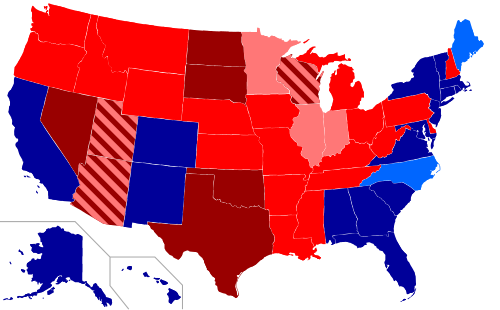…or will they uphold the ruling?
(Background: Kim Davis violated gay couples’ rights - #35 by Maphistos_Sidekick)
It’ll be up to ACB.
I think this dream may be in jeopardy.
I’ve been saying for a while that I expect them to accept a case this fall and overturn it next year.
But more to the point, Roberts, Thomas, and Alito each wrote their own dissents to Obergefell originally, and it is hard to see 2 of Kavanaugh, ACB, and Gorsuch voting to uphold it.
I’d like for them to overturn it, and determine that the federal government has no business being involved in marriage at all.
I wonder if US v Windsor would still be upheld. There are errr…practical federal tax implications to consider.
It would certainly be impressive if they overturned all marriage forever.
“After reviewing the case carefully, we hereby cancel marriage. It’s dumb. The end.”
Sadly, I don’t think they’ll do that. They’ll just fuck over gay people and call it a day.
I’ve said before that I didn’t like the Obergefell decision, for the same reason I didn’t like Roe v Wade - I think it was a stretch by the liberal justices, to fit an agenda that they had. When the amendments were passed, nobody intended them to refer to same-sex marriage, or abortion.
I’m not saying that I’m opposed to same-sex marriage or abortion, but I don’t think the Constitution should be open to new interpretations that were never intended. Either do it through a law, or pass an amendment.
That’s a pretty aggressive stance. The amendments have all needed to be translated many times over to make any sense. Maybe it would work if we could more easily update the constitution.
I guess for an obvious example, do you think Loving vs Virginia should have lost, and should have required a new amendment?
I don’t know enough about the intentions when the 14th Amendment was passed to really have a strong stance. I know that it was passed specifically around issues of race, but back then, even those who opposed slavery and wanted full rights for black people probably thought that interracial marriage was going too far.
So yes, if the intention at the time didn’t include marriage, then I think Loving should have lost the case. Again, it doesn’t mean I agree with the outcome - I just think that given the framework we’re supposed to be working in, the answer should have been that Loving lost.
But as I noted earlier, I don’t think the government should be involved in marriage at all, which would render Loving irrelevant.
Section 1. All persons born or naturalized in the United States, and subject to the jurisdiction thereof, are citizens of the United States and of the State wherein they reside. No State shall make or enforce any law which shall abridge the privileges or immunities of citizens of the United States; nor shall any State deprive any person of life, liberty, or property, without due process of law; nor deny to any person within its jurisdiction the equal protection of the laws.
Well, except for interracial marriage, of course. And, black and white kids in separate (but equal!) schools, and separate (but equal!) public restrooms and water fountains, and…
Imagine the government decided they should give tax breaks to churches but not to temples. I might shrug and say “well I don’t think the government should be involved in religion anyway.”
It might be true, but it’s also a way of shrugging at injustice, which is more important than whether there is a rule in the first place.
Well if they’re not involved in government, then they shouldn’t be giving breaks to any religion. I believe that the first amendment also prevents the government from favoring one religion over another.
Yes, it’s completely true. But it’s sort of irrelevant since it’s not a question in the first place? Broadly I think there’s a case to be made against the government being involved in all sorts of things-- but it’s always more important that the government is fair.
Fully agree. So pass laws to keep it fair. But don’t try and make the Constitution mean something that was never intended.
The job of the Supreme Court is not to make sure everything is fair. Its job is to make sure that laws don’t violate the Constitution.
If you phrased that as “the government has no business being involved in marriage at all”, I’d agree.
Of course, that would complicate the packaging of privileges and responsibilities that come with how government works in the presence of small groups of individual who have (theoretically) voluntarily agreed to cooperate as a single economic unit.
Would be nice to revive the ERA imo
You can have something where you file as a household - show that you live at the same address, and file together. Marriage doesn’t enter into it. So you can have a boyfriend/girlfriend file together, even if they’re not married.
IMO, Obergfell opened a can of worms. If the “traditional” definition of marriage can’t be used, then why stop at same-sex? Why not allow for poly relationships, where it may be a unit of 3 or more people? What about incestual relationships? Why wouldn’t the 14th amendment apply to them as well, if it applies to same-sex?
I’m one of the weird folks who disagree with the SCOTUS’s deprecation of the Ninth Amendment.
As long as the parties consent (and are capable of and competent to give that consent), it’s inappropriate for the government to be involved.
Although, when it comes to incest, I can see reason behind the government seeking to restrict procreation between people who are too-closely related…but I do note that there are cultural differences of opinion on the subject of “how close is too close”, and even today state laws vary on that subject (including potentially voiding marriages registered in other states).
Incestual marriage is already an open can of worms.
Here is where first cousin marriage is legal:
And I think it should be legal everywhere, since the real issue is sexual procreation, which could potentially be regulated seperately.
Poly marriages would I think cause major practical issues. (Nor is there the same constitutional argument.)


